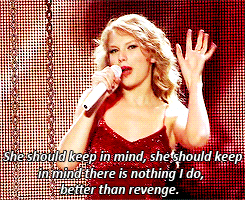"Survival was my only hope, success my only revenge." -Patricia Cornwell
With Taylor Swift's new revengeful attitude, I thought it only fair to give my own take on the idea of vengeance. If you asked me my thoughts on revenge three years ago, I would state that it's not in my character to feel that way.
I was wrong.
Three years later, circumstances have changed, and as my life went tumbling down, I found myself saying, "I want to get back at him." I couldn't believe the words that came out of my mouth, but it was true: I wanted revenge.
 I think of myself as an enthusiastic, kindhearted, warm, compassionate and empathetic person. But when anger, pain, and depression washed over me, all hope was drained. When anger ran through my spine, my sweet nature lost all control without delay. There was very little I could do to control myself. Someone I trusted with all my heart undermined me. I was furious, and it wasn't an emotion I was accustomed to. Now, when I look back at that time in my life, I can acknowledge the sentiments I felt. I understand that it was all natural. Just because I wanted revenge does not mean I transformed into an evil being.
I think of myself as an enthusiastic, kindhearted, warm, compassionate and empathetic person. But when anger, pain, and depression washed over me, all hope was drained. When anger ran through my spine, my sweet nature lost all control without delay. There was very little I could do to control myself. Someone I trusted with all my heart undermined me. I was furious, and it wasn't an emotion I was accustomed to. Now, when I look back at that time in my life, I can acknowledge the sentiments I felt. I understand that it was all natural. Just because I wanted revenge does not mean I transformed into an evil being.
Revenge isn't a positive or a negative attitude; instead, feelings of reprisal are a basic animal instinct. As such, us humans can't help but feel the thirst for requital when someone screws us over. As people, we want to show him/her the stronger version of ourselves. Psychologists say that in certain positions, individuals can possess a complex yearning for vengeance, and studies have even said "that the human brain can take pleasure in certain kinds of revenge." Shockingly, even the thought of retribution triggers the reward center of the brain, and drugs act in a similar fashion!
When looking at evolution, one can detect the need for revenge: to ensure one's safety. To teach a lesson. An eye for an eye. Experts define revenge as "the output mechanism that [is] designed for deterrence of harm," especially after an individual has caused harm on another.

Nonetheless, professionals don't necessarily believe that the common feeling of revenge is healthy.
A professor of psychology at Fordham University in New York compares revenge to hate as it "takes a toll on the person who feels wronged, as well as the [person's] enemy. It is inherently unhealthy because it takes a psychological and physical toll on the person. Venting those feelings of anger and hostility does not decrease those feelings."
Revenge allows us an output for one's emotional release. However, this psychological relief doesn't last. Thus, it is more advantageous to find other ways to release this need for revenge. Each individual has a unique way of regaining balance in themselves. Some love to workout and spend their time doing yoga and meditating. Some love to crawl into a corner and stick their noses into an enthralling book. Some love to dance around their room until they have exhausted themselves. Anything that betters YOU as an individual is better than focusing on harming another being.
"Oh, darling. You can't fix yourself by breaking someone else." - Anonymous
Generally, I have learned that it is okay to want revenge. It is okay to want someone to feel pain in return for your aching. It is okay to feel irate. However, it is up to the individual on how to deal with these passions. Personally, I would never physically or mentally hurt someone, that's where I draw the line: I will never intentionally harm another being no matter what another did to me. I will never go lower when someone has already gone low. Yet, I cannot control the desire to want some sort of revenge; thus, I will find my specific output to reclaim my balance. So far, it has been writing. :)




 StableDiffusion
StableDiffusion
 StableDiffusion
StableDiffusion
 student thinking i shouldnt have procrastinated all semester
StableDiffusion
student thinking i shouldnt have procrastinated all semester
StableDiffusion
 Photo by
Photo by  Photo by
Photo by  Photo by
Photo by  StableDiffusion
StableDiffusion
 StableDiffusion
StableDiffusion
 Photo by
Photo by  Photo by
Photo by 


 Lumiere figure at the Disney Store at the Ala Moana Shoppi… | Flickr
Lumiere figure at the Disney Store at the Ala Moana Shoppi… | Flickr








 StableDiffusion
StableDiffusion StableDiffusion
StableDiffusion 10. Extra BlanketsJuwenin Home 100% Cotton Knitted Throw Blanket
10. Extra BlanketsJuwenin Home 100% Cotton Knitted Throw Blanket StableDiffusion
StableDiffusion StableDiffusion
StableDiffusion File:Kishlaru familie.jpg - Wikimedia Commons
File:Kishlaru familie.jpg - Wikimedia Commons Photo by Hanna Balan on Unsplash
Photo by Hanna Balan on Unsplash StableDiffusion
StableDiffusion black blue and yellow round illustrationPhoto by
black blue and yellow round illustrationPhoto by 













